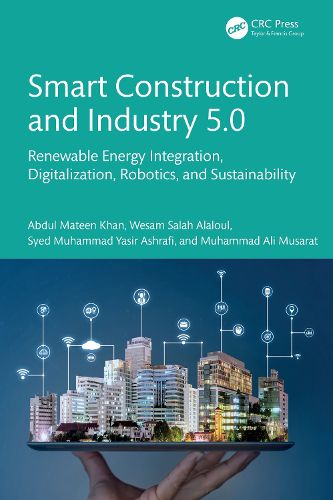Readings Newsletter
Become a Readings Member to make your shopping experience even easier.
Sign in or sign up for free!
You’re not far away from qualifying for FREE standard shipping within Australia
You’ve qualified for FREE standard shipping within Australia
The cart is loading…






This book addresses the profound changes facing the construction sector to provide a comprehensive and forward-looking exploration of how renewable energy systems and intelligent technologies are reshaping the construction industry toward a more sustainable, resilient, and cost-efficient future.
The authors begin by examining the global development of solar, wind, and hydropower systems, emphasizing their potential to decarbonize the built environment when effectively integrated into building and infrastructure design. The discussion extends to the role of construction practices in advancing sustainability, showcasing real-world projects such as net-zero and energy-positive buildings that exemplify the application of renewable technologies in modern construction. The book explores the impact of Industry 4.0 and Construction 5.0, presenting how digital tools such as artificial intelligence, IoT, robotics, blockchain, and big data are transforming design processes, site operations, energy management, and performance monitoring. It also addresses how automation and human-robot collaboration are redefining productivity, safety, and workforce dynamics in construction. Central to the book is the integration of Building Information Modelling as a collaborative platform for planning, simulating, and managing renewable energy facilities. It further introduces life cycle cost analysis as a critical decision-making framework, linking economic viability with environmental performance across a project's lifespan. The research-informed analysis and practical case examples provided throughout allow readers to implement intelligent and low-carbon solutions in the built environment.
As this book provides valuable insights on technical, financial and energy resource issues, it is an invaluable resource for researchers and anyone in the construction industry who is seeking to improve sustainability, productivity, and efficiency in their projects. It is especially beneficial for architects and designers, engineers, project managers, construction managers, and contractors, among others.
$9.00 standard shipping within Australia
FREE standard shipping within Australia for orders over $100.00
Express & International shipping calculated at checkout
This book addresses the profound changes facing the construction sector to provide a comprehensive and forward-looking exploration of how renewable energy systems and intelligent technologies are reshaping the construction industry toward a more sustainable, resilient, and cost-efficient future.
The authors begin by examining the global development of solar, wind, and hydropower systems, emphasizing their potential to decarbonize the built environment when effectively integrated into building and infrastructure design. The discussion extends to the role of construction practices in advancing sustainability, showcasing real-world projects such as net-zero and energy-positive buildings that exemplify the application of renewable technologies in modern construction. The book explores the impact of Industry 4.0 and Construction 5.0, presenting how digital tools such as artificial intelligence, IoT, robotics, blockchain, and big data are transforming design processes, site operations, energy management, and performance monitoring. It also addresses how automation and human-robot collaboration are redefining productivity, safety, and workforce dynamics in construction. Central to the book is the integration of Building Information Modelling as a collaborative platform for planning, simulating, and managing renewable energy facilities. It further introduces life cycle cost analysis as a critical decision-making framework, linking economic viability with environmental performance across a project's lifespan. The research-informed analysis and practical case examples provided throughout allow readers to implement intelligent and low-carbon solutions in the built environment.
As this book provides valuable insights on technical, financial and energy resource issues, it is an invaluable resource for researchers and anyone in the construction industry who is seeking to improve sustainability, productivity, and efficiency in their projects. It is especially beneficial for architects and designers, engineers, project managers, construction managers, and contractors, among others.